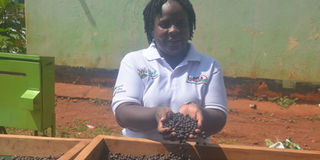Coffee growers struggle with EU deforestation rules ahead of deadline

The Director Quality Regulatory Services in UCDA Ms Doreen Rose Rweihangwe while exhibiting the proper methods of drying coffee. PHOTO BY TAUSI NAKATO
What you need to know:
However, some smallholder farmers in Busoga Sub-region are worried that their products may miss the European market due to what they perceive as government delays in sensitizing them about the new regulation
Many coffee farmers in Busoga Sub-region have expressed unawareness of the upcoming European Union Deforestation Regulation (EUDR), which comes into effect on December 31. According to the EUDR, farmers must prove that their coffee is from land where no deforestation has occurred since 2020 to export to the European market. This puts farmers organized into cooperatives in a prime position to meet the traceability requirements.
However, some smallholder farmers in Busoga Sub-region are worried that their products may miss the European market due to what they perceive as government delays in sensitizing them about the new regulation. Mr Ronald Ntange, a coffee farmer in Namayingo District, said: “I have been a coffee farmer for 15 years, but I am just hearing about this information now. Agricultural officers have not reached out to us for sensitization or registration.”
Mr Ntange, who owns six acres of coffee plantations, noted that compliance with the EUDR might be easier through forming cooperatives for better identity and marketing. However, some farmers are reportedly reluctant to join cooperatives. The chairperson of the Coffee Farmers, Buyers, and Processors’ Association in Mayuge District, Mr. Jamir Nzigu, criticized the government for not taking the EUDR issue seriously, despite coffee being a major export.
Mr Nzigu, who owns a four-acre coffee plantation, warned that the price of coffee might decrease if the EU export market shrinks due to non-compliance with the new regulations. Currently, a kilogram of dry sorted coffee is priced at Shs15,000, but he fears it may drop if the government does not prioritize the EUDR. He explained that a reduction in export volumes would impact coffee prices due to supply and demand forces.
Mr Edward Paul Munaaba, the proprietor of Edwards Hamlet Regeneration Centre in Jinja City, said that local leaders have not adequately informed coffee farmers about the EUDR. “Members of Parliament are supposed to create awareness about the EUDR,” Mr. Munaaba, who is also the Minister in Charge of General Duties in the Office of the Busoga Kingdom Katukkiro (Prime Minister), said. He added that while he supports the EUDR for its environmental benefits, smallholder farmers need support to avoid exclusion from the EU market.
Other products targeted by the EUDR include cattle, cocoa, oil palm, rubber, soya, and wood.
Mr Patrick Nabongo, Chairperson of the Busoga Coffee Farmers, Producers, and Processors Association, expects the Uganda Coffee Development Authority (UCDA) to start registering coffee farmers this month as part of the EUDR compliance process. “We expect UCDA in Busoga sub-region to sensitize and register farmers in the remaining three months before we meet the deadline so that our coffee can be exported to Europe,” he said. He urged farmers to embrace the registration exercise, assuring them that it is not intended to overburden them.
Ms Doreen Rose Rweihangwe, UCDA Director of Quality Regulatory Services, stated that the UCDA is making “every effort” to comply with the regulation, given that the European Union imports about 70 percent of Uganda’s coffee. She mentioned that Parliament has allocated funds to support farmer registration and mapping. “We are mapping every farmer and their coordinates to ascertain whether the coffee was from a deforested area; if so, it will not be part of the consignment,” Ms. Rweihangwe said. She added that the National Coffee Act, which was assented to by the President, gives the UCDA the mandate to oversee all work on and off the farm.
The UCDA plans to spend Shs35 billion on installing a coffee traceability system to monitor the quality of coffee produced in Uganda and ensure compliance with EUDR requirements. The Ministry of Finance has committed to providing up to Shs13 billion in the 2024/2025 Financial Year for registering farmers and implementing the national traceability system.




